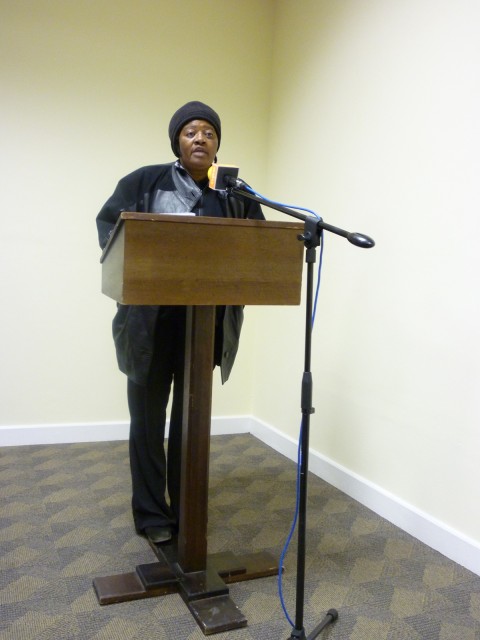In Namibia's abortion debate, echoes of a repressive history
Activists such as Rosa Namises see the nation's abortion law as an inheritance from a racist government—one that contributes to high maternal death rates.

(The Christian Science Monitor) The president’s voice came booming in through the open window of Rosa Namises’s house, crackling over the loudspeakers from the soccer stadium next door.
It was the early 1990s, just years after Namibia’s independence from South Africa, a time when nearly every speech a politician gave was like a series of patriotic how-to guides on building a new country. Namises recalls President Sam Nujoma explaining that Namibia was a small nation. Too small, in fact. It simply didn’t have enough people.
Read our latest issue or browse back issues.
“It’s your patriotic duty to have children,” she remembers him saying.
Namises had hoped independence would mean the chance to reform Namibia’s strict abortion law. Something she’d long feared was confirmed: now, if she advocated for abortion rights, it wouldn’t just be an affront to social norms. “It would be seen as unpatriotic,” she said.
Namises has been an activist for women and children for decades and served for several years as a member of parliament. In the 1970s, she worked as a nurse in the obstetrics and gynecology ward of a large public hospital in Windhoek, the Namibian capital. Every week, she said, she saw women arrive at the hospital near death after attempting to perform their own abortions or paying an herbalist to do it for them. The women always told her the same thing—that they’d had a miscarriage—and she never asked for more details. But the more she saw, the angrier she grew.
For Namises and many other women’s health advocates, this tragic problem remains unaddressed. Namibian newspapers regularly carry stories of “baby dumping,” or mothers throwing away newborns. And the fact that many Namibians are still seeking abortions illegally shows how necessary reform has become, Namises argued.
“This law was never based at all on our culture or experiences,” she said. “It was always something imposed on us.”
For much of the 20th century, Namibia—a Texas-sized slab of desert on the southwest coast of Africa—was a colony of white-ruled South Africa. When it became independent, it still had many of the old apartheid government’s laws on the books. Among them was an almost total prohibition on abortion, passed in the mid-1970s amid rising anxiety that the minority white population wasn’t having children fast enough to stop itself from being vastly outnumbered.
Like many African countries, Namibia faced a dilemma when it came to colonial legislation, such as its abortion law. For many women’s health advocates, it was simply one more inheritance from a racist government, one that continues to contribute to high maternal death rates. But the prohibition mirrors the views of many Namibians that abortion is a sin and shouldn’t be allowed.
Around the continent, many colonial laws remain in force today, and how to deal with them has become a kind of societal reckoning. In some countries, laws’ origins have inspired contemporary pushes for their removal. Nineteen African countries, for instance, no longer have the death penalty. Many who pushed for it to be overturned argued that it was a colonial tool of intimidation and suppression that had no place in their free society.
But in other cases, such laws helped set social norms that persist to the present day. Old British penal codes criminalizing homosexuality, for instance, have been used to suppress LGBT activism in several former African colonies, notably Uganda.
In Namibia, conservative Christian social norms have dominated the new government, and the old law on abortion has remained intact, as do many similar ones across the continent. Of the 54 countries in Africa today, only South Africa, Zambia, Mozambique, Cape Verde, and Tunisia allow abortion in a broad range of circumstances. Namibia allows abortion only in cases of rape, incest, or when a pregnancy endangers the life of mother or child.
Current statistics on abortion in Namibia are difficult to come by. However, data from the Namibian Ministry of Health, though based on a sample size of only 60 women, suggests that up to 16 percent of maternal deaths are caused by abortions, and thousands of women check themselves into hospitals each year for “spontaneous abortions”—a term that can include unexpected or purposeful miscarriage.
Continuing efforts to loosen abortion restrictions, however, remain controversial.
“Namibia is at its core a very religious nation, and I think for government there was and is quite a lot of weight attached to the church’s views,” said Clem Marais, the general secretary of the Dutch Reformed Church in Namibia.
But the abortion law, established under the 1970s-era apartheid government, was also meant to serve a very different purpose: white rule.
“The government saw a moral crisis if white women kept aborting the next generation of the white race,” said Susanne Klausen, a professor at Carleton University in Canada and author of Abortion under Apartheid. “There was a real panic there.”
After apartheid, Klausen said, many feminists saw an opening: considering the law’s origins, they reasoned, who would want to keep it around?
But many postcolonial governments, including Namibia’s, haven’t seen it that way in the decades since then. Instead, taking a firmly conservative stance on social issues like abortion, sexuality, and the death penalty has become a way to assert independence from the West, which is seen as permissive.
“At the moment we are frozen,” Namises said. “Our way of thinking about this is outdated, but we haven’t yet found a way to take it on and change it.”
A version of this article, which was edited on February 26, appears in the print edition under the title “In Namibia, debate over abortion echoes history of repression.”






